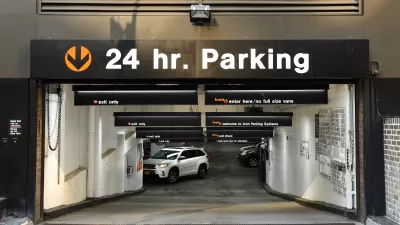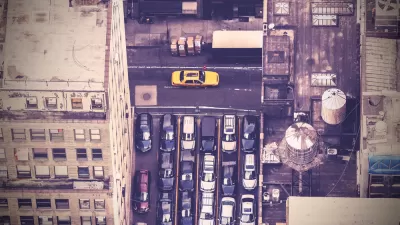Writing in the Economix blog for the New York Times, Nancy Folbre investigates the economic impact of traffic and revives the idea of congestion pricing for Manhattan.
Traffic is an acknowledged problem for productivity and quality of life for most Americans. As Folbre reports, a recent estimate puts the cost of commuter delays alone at $100 billion in the United States.
Of the potential solutions, studies have shown that efforts to increase capacity, such as widening roads, does little to reduce congestion. According to Folbre, another potential solution being explored in New York to increase the amount of taxis in the city would slow traffic by 12%.
Ultimately Folbre returns to Congestion Pricing, which Mayor Michael R. Bloomberg pushed hard for in 2008, and has proven successful in London and Stockholm. And she references economist Charles Komanoff, who asserts that the opposition to Bloomberg's previous plan, "could be overcome with a clear plan to use the revenues to expand and improve public transportation in the city."
"More than $1 billion in projected annual revenues from this plan could significantly improve the bus, subway and bike-lane systems that many New Yorkers rely upon. The resulting changes could make it easier for residents of the boroughs and suburbs to get into and out of the central business district."
FULL STORY: Traffic Jam Economics

Maui's Vacation Rental Debate Turns Ugly
Verbal attacks, misinformation campaigns and fistfights plague a high-stakes debate to convert thousands of vacation rentals into long-term housing.

Planetizen Federal Action Tracker
A weekly monitor of how Trump’s orders and actions are impacting planners and planning in America.

In Urban Planning, AI Prompting Could be the New Design Thinking
Creativity has long been key to great urban design. What if we see AI as our new creative partner?

Massachusetts Budget Helps Close MBTA Budget Gap
The budget signed by Gov. Maura Healey includes $470 million in MBTA funding for the next fiscal year.

Milwaukee Launches Vision Zero Plan
Seven years after the city signed its Complete Streets Policy, the city is doubling down on its efforts to eliminate traffic deaths.

Portland Raises Parking Fees to Pay for Street Maintenance
The city is struggling to bridge a massive budget gap at the Bureau of Transportation, which largely depleted its reserves during the Civd-19 pandemic.
Urban Design for Planners 1: Software Tools
This six-course series explores essential urban design concepts using open source software and equips planners with the tools they need to participate fully in the urban design process.
Planning for Universal Design
Learn the tools for implementing Universal Design in planning regulations.
Gallatin County Department of Planning & Community Development
Heyer Gruel & Associates PA
JM Goldson LLC
City of Camden Redevelopment Agency
City of Astoria
Transportation Research & Education Center (TREC) at Portland State University
Jefferson Parish Government
Camden Redevelopment Agency
City of Claremont





























